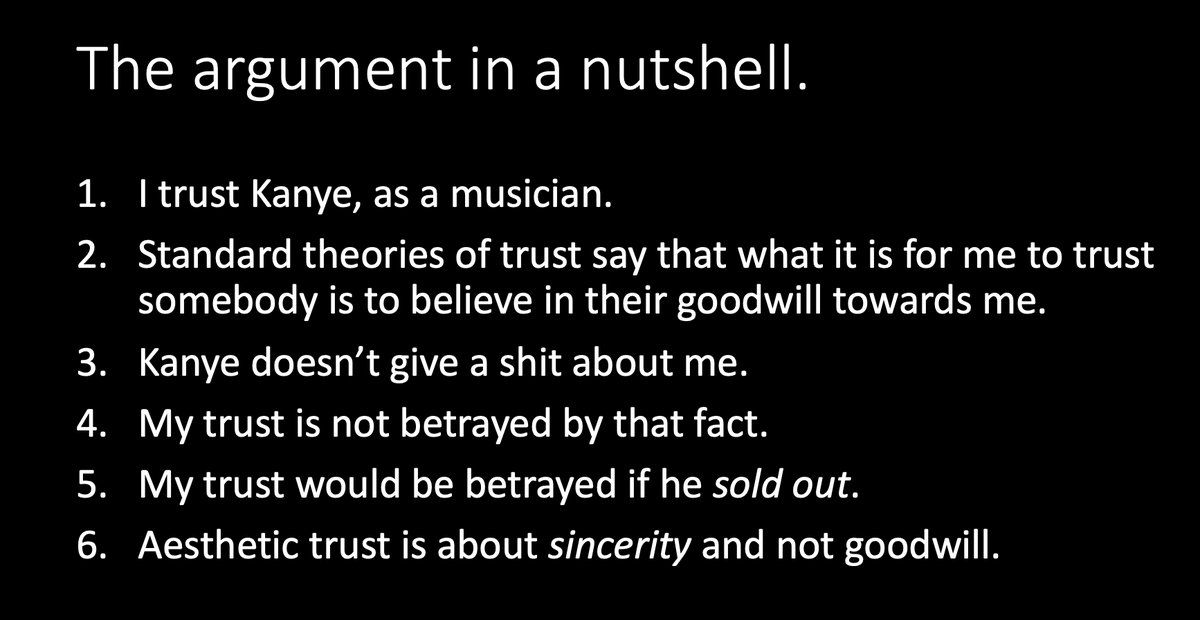New paper, "Trust and Sincerity in Art"!
It& #39;s about how much we need to trust each other, to grow and develop our tastes. It& #39;s about aesthetic echo chambers. And it& #39;s about how weird aesthetic trust is. Because we trust artists to be, not good, but sincere.
Thread and link:
It& #39;s about how much we need to trust each other, to grow and develop our tastes. It& #39;s about aesthetic echo chambers. And it& #39;s about how weird aesthetic trust is. Because we trust artists to be, not good, but sincere.
Thread and link:
Consider "difficult art": art which needs some real effort and emotional investment before we can see the value.
Puzzle: why would you ever invest the effort before you see the value? It can& #39;t be from the art itself; it needs to be from the social context - from trust.
Puzzle: why would you ever invest the effort before you see the value? It can& #39;t be from the art itself; it needs to be from the social context - from trust.
We spend the effort because we already trust the artist, or a friend& #39;s recommendation, or a reviewer or curator, or an artistic community.
Trust is what motivates us to push past that initial hump, to invest the effort and see the wonders beyond.
Trust is what motivates us to push past that initial hump, to invest the effort and see the wonders beyond.
This means there can be aesthetic echo chambers. Like, if you grow up only trained on classical music, and trusted people only with similar taste, you might develop only your classical listening skills, and *never be motivated to put in the effort to acquire sensitivity to rap*
(PS I& #39;ve published about political echo chambers. But I started thinking about first about artistic echo chambers, years ago. One question for me was: how can you tell the difference between pretentious snobs and an art style you haven& #39;t learned?)
The paper distinguishes between 3 kinds of aesthetic trust:
Reliability: trusting somebody to make good art
Sincerity: trusting somebody to stay true to their aesthetic sensibility
Steadfastness: trusting somebody to stay true to a given style
Reliability: trusting somebody to make good art
Sincerity: trusting somebody to stay true to their aesthetic sensibility
Steadfastness: trusting somebody to stay true to a given style
Trust in aesthetic reliability solves the motivational puzzle of difficult art. But weirdly, we seem to care even more about sincerity. We are betrayed, not by the bold artistic failure, but by the *sell-out*.
So why do we care about aesthetic sincerity? Two suggestions:
1. We care more about originality than predictable competence.
2. We care about discovering a shared natural similarity between us, and not about coordinating to converge.
1. We care more about originality than predictable competence.
2. We care about discovering a shared natural similarity between us, and not about coordinating to converge.
Background goals: to expand the analysis of trust beyond the moral domain, into the aesthetic domain. Because it gets weird with art. And to push for more deeply social understandings of aesthetic motivation than the hyper-individualistic current literature typically allows.
"Trust and Sincerity in Art" is forthcoming in Ergo. The pre-print is free and online, here:
https://philpapers.org/archive/NGUTAS.pdf">https://philpapers.org/archive/N...
https://philpapers.org/archive/NGUTAS.pdf">https://philpapers.org/archive/N...

 Read on Twitter
Read on Twitter


